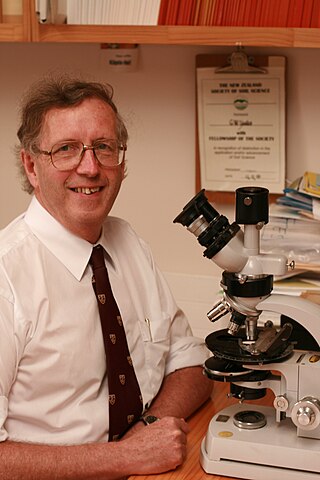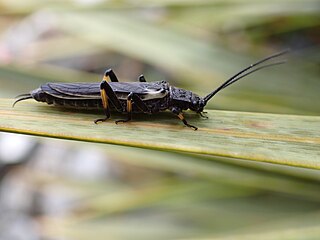Related Research Articles

An ecoregion is an ecologically and geographically defined area that is smaller than a bioregion, which in turn is smaller than a biogeographic realm. Ecoregions cover relatively large areas of land or water, and contain characteristic, geographically distinct assemblages of natural communities and species. The biodiversity of flora, fauna and ecosystems that characterise an ecoregion tends to be distinct from that of other ecoregions. In theory, biodiversity or conservation ecoregions are relatively large areas of land or water where the probability of encountering different species and communities at any given point remains relatively constant, within an acceptable range of variation . Ecoregions are also known as "ecozones", although that term may also refer to biogeographic realms.

The common river galaxias or Canterbury galaxias is a galaxiid fish of the genus Galaxias, found only in the Canterbury and Otago regions of New Zealand.

Water pollution in New Zealand is an increasing concern for those who use and care for waterways and for New Zealand regulatory bodies. An increase in population is linked to an increase in water pollution, due to a range of causes such as rural land use, industrial use and urban development. Fresh water quality is under pressure from agriculture, hydropower, urban development, pest invasions and climate change. While pollution from point sources has been reduced, diffuse pollution such as nutrients, pathogens and sediments development and from stormwater in towns is not under control. There are more than 800 water quality monitoring sites around New Zealand that are regularly sampled.

Water is relatively abundant in New Zealand due to the temperate climate and maritime weather patterns. In recent years, water pollution and draw-down of aquifers have become important environmental issues in New Zealand.

Lloyd Thomas Evans was a New Zealand plant physiologist who made his career in Australia.

Gregor William Yeates, publishing as GW Yeates, was a New Zealand soil zoologist and ecologist. He was "considered the world's leading authority in soil nematode ecology, a subject of economic and ecological importance."

Paula Elizabeth Jameson is a New Zealand plant physiologist.

Martin W. Doyle is a Professor of Water Science at the Nicholas School of Environment of Duke University.
Jamie Sue Stang is an American dietitian and nutritionist. She is an associate professor in the Division of Epidemiology and Community Health at the University of Minnesota School of Public Health.
Randall Scott Peterson is a professor of Organisational Behaviour and Academic Director of the Leadership Institute at London Business School.

Wei Biao Wu is a Chinese-born statistician. He is a professor of statistics at the University of Chicago.
Tania Schoennagel is an ecologist who specializes in wildfires and insect outbreaks. She is a research scientist at the University of Colorado, Boulder and has been involved with INSTAAR since 2011.
Elizabeth Dickinson Getzoff is an American biochemist. She holds a joint appointment at Scripps Research Institute in California, as professor emeritus in immunology and Microbiology, as well as integrative structural and computational biology (ISCB)

Jane Sandall is professor of social science and women's health at the Women's Health Academic Centre of King's College London. Sandall leads the Maternal Health Services and Policy Research Group in King's Health Partners Women’s Health Academic Centre and is also a lead for the National Institute for Health Research (NIHR) South London Applied Research Collaboration. She has authored several Cochrane reviews on midwife-led settings and hundreds of peer-reviewed papers. Her contribution to midwifery and women's health was awarded with an CBE. She also received an honorary doctorate in health sciences from the University of Technology Sydney in 2014.
William V. Tamborlane has been Professor and Chief of Pediatric Endocrinology at Yale School of Medicine since 1986.
Benjamin Van Mooy is an oceanographer and senior scientist at the Woods Hole Oceanographic Institution located in Woods Hole, MA. His work primarily focuses on chemical oceanography, with a particular focus on the production and remineralization of marine organic matter.

Susanna Wood is a New Zealand scientist whose research focuses on understanding, protecting and restoring New Zealand's freshwater environments. One of her particular areas of expertise is the ecology, toxin production, and impacts of toxic freshwater cyanobacteria in lakes and rivers. Wood is active in advocating for the incorporation of DNA-based tools such as metabarcoding, genomics and metagenomics for characterising and understanding aquatic ecosystems and investigating the climate and anthropogenic drivers of water quality change in New Zealand lakes. She has consulted for government departments and regional authorities and co-leads a nationwide programme Lakes380 that aims to obtain an overview of the health of New Zealand's lakes using paleoenvironmental reconstructions. Wood is a senior scientist at the Cawthron Institute. She has represented New Zealand internationally in cycling.
Laura M Padilla-Walker is an American developmental psychologist and academic administrator. She is a professor in the School of Family Life at Brigham Young University. She was an associate dean for the BYU College of Family, Home and Social Sciences from 2017-2021 until she became the dean in July 2021.
Tara G McAllister is a New Zealand freshwater ecology academic and is associated with Te Pūnaha Matatini at the University of Auckland. She is a Māori of Te Aitanga ā Māhaki, Ngāti Porou, and European descent.

Austroperla cyrene, the black stonefly, is a species of austroperlid stonefly endemic to New Zealand. It is the single species in the genus Austroperla. The species is a 'shredder' that lives and feeds on decomposing wood and leaves in streams throughout New Zealand. It is particularly common in forested streams but relatively rare or absent from deforested streams.
References
- ↑ Harding, Jon (1994). Lotic ecoregions of New Zealand (Doctoral thesis). UC Research Repository, University of Canterbury. doi:10.26021/8665. hdl:10092/4754.
- ↑ Official web site at the University of Canterbury
- 1 2 3 4 5 6 Google Scholar Author page, Accessed 29 July 2021